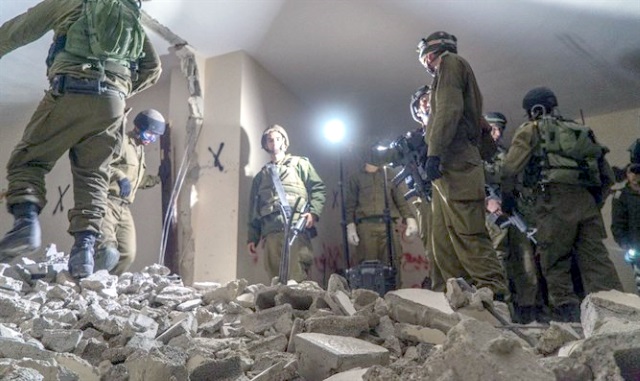Victims of Palestinian terrorism called on the Israeli government to carry out its own policy and demolish terrorist homes during a Knesset committee debate, Wednesday.
By Jack Gold, World Israel News
The Knesset’s Foreign Affairs and Defense Committee convened on Wednesday to discuss Israel’s failure to swiftly carry out the demolition of homes of Palestinian terrorists, according to Israeli law.
Israel razes terrorists’ homes in order to deter future attacks. Some Knesset members say that the process of demolition moves too slowly, making it less effective as a deterrence.
The head of operations in the Defense Ministry reported that since 2015, 45 terrorist homes have been destroyed, and another four are facing demolition. This number represents only 30 percent of all terrorists’ homes slated for demolition.
Brig. Gen. Rani Peled, a representative of the National Security Council (NSC) at the Committee claims that “in the past three years, there has been a complete change in the government’s policy in all its nuances regarding the demolition of terrorists’ houses.”
A home demolition is supposed to take place in two weeks, he said, but the time frame is hard to meet. The Israeli Army’s legal adviser for Judea and Samaria said the average time to demolish a terrorist’s house is more like two months.
High Court interference?
A Justice Ministry representative said the attorney general’s position is that only homes belonging to terrorists who succeeded in killing should be destroyed.
Jewish Home MK Moti Yogev charged that the Supreme Court interferes in the process.
“More than we deter the families of the terrorists and the murderers from committing murder, the judicial system is deterred by the High Court of Justice fearing that it will cancel the will of the elected authorities and the Israeli nation, which is to deter, reduce attacks and protect the lives of its citizens.”
Committee Chairman Avi Dichter, a former Shin Bet (or “Israel’s Security Agency”) chief, expressed surprise at the Justice official’s comments.
“I’ve been dealing with terrorism for decades. I did not know that house demolitions are related to the outcome of the attack, meaning that if the murderer succeeded, then there is cause for demolition, and if he does not succeed, there is no cause for demolition,” he said.
Dichter said there’s no legal basis for the distinction. “This mistake will disappear from our jargon,” he said, clarifying that terrorist’s homes would be demolished whether they wounded or killed.
Representatives of bereaved families noted the Israel Defense Forces serious failure in carrying out its demolition policy. They called on the government to step up its actions.
Bat-El Kolman spoke of her brother-in-law, Adiel Coleman, who was stabbed to death by a terrorist in Jerusalem’s Old City in March. She said the terrorist was diagnosed with mental illness by the Israel Defense Forces and so his home was left intact.
“The terrorist’s house is standing,” Coleman told the Committee, presenting them with a poem written by the terrorist on the birth of his son, and which was posted on Facebook, extolling terrorism.
“This terrorist writes these words, and the IDF finds it necessary to bring this person into Israel to look for work, and then declares him insane,” she said. “I want to understand why the IDF meets the lawyers of terrorists and not the lawyers of bereaved families? Why does the army determine on its own that he is mentally ill? There is a feeling that there is no policy,” she said, urging the Committee to “do what they can so there will be no more bereaved families.”
Rafi Levengrond, whose daughter Kim was murdered in a terrorist attack at the Barkan Industrial Park in Samaria earlier this month with Ziv Hajbi, also addressed the Committee.
“My daughter was bound and executed. She was not killed in a regular attack. And when the military people think about what to destroy for the terrorist, think about what she thought in the last few seconds,” he told IDF representatives present.
The terrorist is still at large and his house has yet to be demolished.
Arik Lubarsky, the brother of late IDF soldier Ronen Lubarsky, who was killed in Ramallah in June, noted that his brother’s murderer came from a family of five terrorists who are serving time in Israeli prisons.
Their home was demolished in 1990 and rebuilt in 1996. “Even now when the army came to destroy, they wanted to demolish only two stories. It was rebuilt very quickly,” he said.
Miriam Fuld, the widow of Ari, who was murdered six weeks ago at the Gush Etzion junction, said “I am a widow because nothing deterred these murderers. A month and a half has passed since the murder, and the terrorist’s house is still standing. Additional deterrence is required. I ask you to demolish their houses.”
Exile broached
The committee also discussed the possibility of expelling terrorists’ families.
IDF Lt. Col. (res.) Morris Hirsch, a former Judea and Samaria attorney, said that “you have to ask how many attacks were committed, not how many houses were destroyed,” and called for the banishment of terrorists to Gaza.
Herzl Hajaj, the father of Lt. Shir Hajaj who was murdered in an attack at Armon Hanatziv in January 2017, said that “there is a structural problem. It is necessary to demolish the terrorist’s house immediately, to expel the terrorist and his immediate family, as well as the [demolition of] 110 houses of terrorists who have not yet been destroyed. It is necessary that everything be anchored in the law so that execution will not be dragged in court.”
“To murder a Jew is the most economical industry,” he said, like winning the lottery.
“The state of Israel cannot play chess or checkers with anyone who plays judo with us. There are millions of dollars allocated to protect terrorists in the High Court of Justice, and Israeli lawyers defend them. I feel that I am not in my country,” he said.




